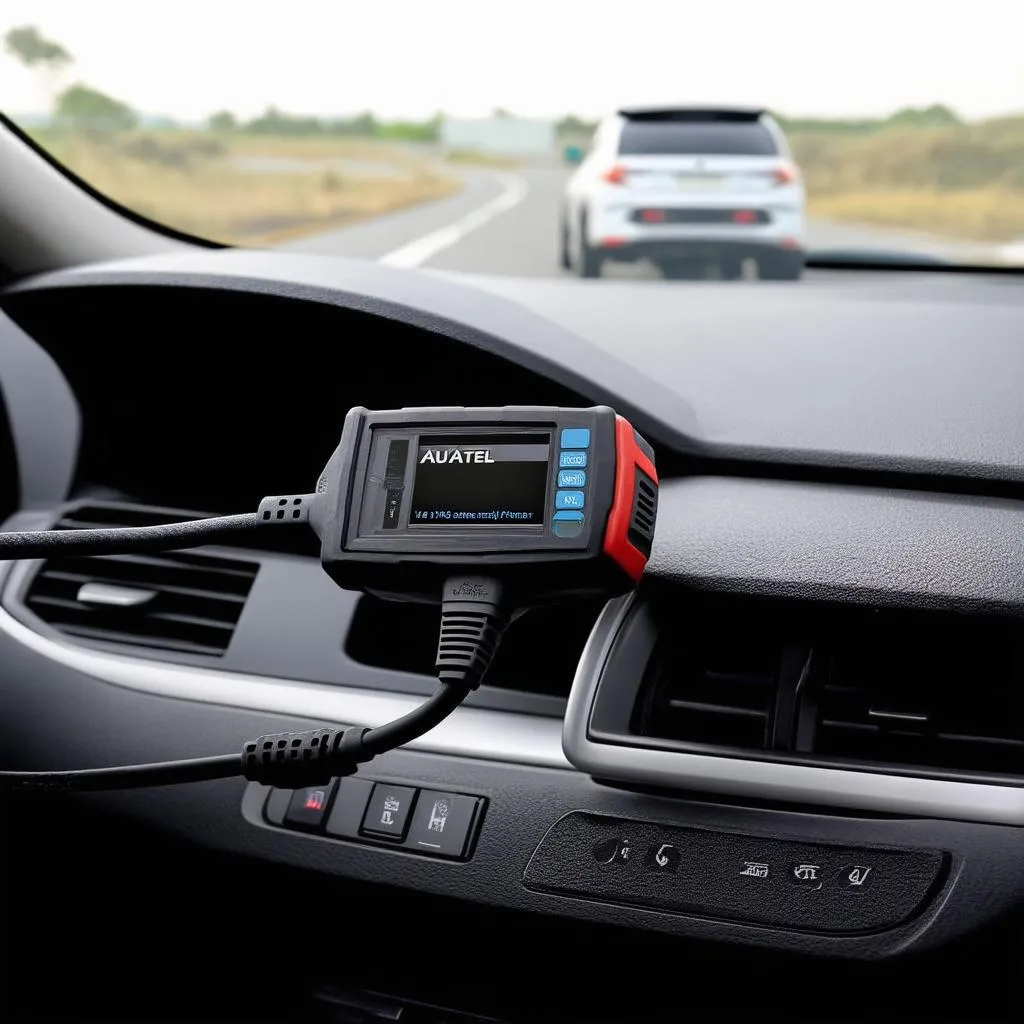Have you ever encountered the dreaded “AdBlue system fault” warning light on your European car dashboard? It can be a real buzzkill, right? Well, fear not! This comprehensive guide will walk you through the “teach-in for refill of AdBlue Autel,” a procedure synonymous with getting your Selective Catalytic Reduction (SCR) system back on track. Whether you’re a seasoned mechanic or a DIY enthusiast, understanding this process is crucial for maintaining your vehicle’s performance and environmental friendliness.
Decoding the Jargon: AdBlue, Autel, and Teach-in
Before we jump into the how-to, let’s break down the key players:
AdBlue: This non-toxic fluid, also known as Diesel Exhaust Fluid (DEF), is crucial for reducing harmful NOx emissions in diesel engines. Think of it as an elixir for a cleaner planet.
Autel: A renowned name in automotive diagnostics, Autel scanners are the go-to tools for professionals and car enthusiasts alike. These devices offer advanced functionalities, including the “teach-in” procedure for AdBlue systems.
Teach-in: After refilling AdBlue, this procedure essentially tells your car’s computer, “Hey, we’re good to go!” It ensures that the system recognizes the refill and resumes its emissions-reducing magic.
Why is the Autel Teach-in Essential After an AdBlue Refill?
Imagine this: you’ve just refilled your AdBlue tank, but your car’s system is still throwing a fit. Frustrating, right? This is where the Autel teach-in procedure comes in.
The teach-in process updates the vehicle’s ECU (Engine Control Unit) about the AdBlue refill. Without it, the system might not recognize the new fluid, leading to:
- Persistent warning lights: That pesky “AdBlue system fault” message won’t disappear on its own.
- Limited engine performance: Your car might enter “limp mode” to prevent potential damage, restricting your speed and acceleration.
- Increased emissions: The SCR system might not function optimally, leading to higher NOx emissions.
Think of the teach-in as a reset button that ensures seamless communication between your car’s brain (the ECU) and its emissions control system.
The Autel Teach-in Procedure: A Step-by-Step Guide
Now, let’s get down to business. Here’s a simplified guide to performing the Autel teach-in for AdBlue refill:
- Connect your Autel scanner: Turn on the ignition and connect your Autel diagnostic tool to your car’s OBD-II port.
- Select the correct vehicle model: Navigate the Autel menu to select your car’s make, model, and year.
- Access the AdBlue system: Find the “Special Functions” or “Service” menu and select “AdBlue System.”
- Choose “Teach-in”: You should see an option for “AdBlue refill teach-in” or a similar term. Select it.
- Follow the on-screen prompts: The Autel scanner will guide you through the process, which typically involves confirming the refill quantity and verifying system parameters.
Important Note: The exact steps and terminology may vary slightly depending on your Autel scanner model and vehicle. Always refer to the user manuals for specific instructions.
FAQs: Your Burning Questions Answered
Q: Can I drive my car without performing the Autel teach-in after refilling AdBlue?
Technically, yes, but it’s not recommended. You might be able to drive for a short distance, but the warning light will likely persist, and the engine’s performance might be limited.
Q: Is it safe to perform the Autel teach-in myself, or should I take it to a mechanic?
If you’re comfortable using an Autel scanner and following instructions, you can perform the teach-in yourself. However, if you’re unsure about any step, it’s always best to consult a qualified mechanic.
Q: How often do I need to perform the AdBlue refill and teach-in procedure?
The frequency of AdBlue refills depends on your driving habits and vehicle model. Typically, you’ll need a refill every 5,000 to 10,000 miles.
Beyond the Teach-in: Maintaining a Healthy AdBlue System
Just like any other system in your car, your AdBlue system requires proper care and attention. Here are a few tips to keep it in top shape:
- Use only high-quality AdBlue fluid: Low-quality or contaminated fluid can damage the SCR system.
- Don’t let the AdBlue tank run dry: Running out of AdBlue can trigger warning lights and even prevent your car from starting.
- Schedule regular maintenance checks: Have your AdBlue system inspected by a qualified mechanic during routine maintenance.
Driving Towards a Greener Future
Understanding the Autel teach-in procedure for AdBlue refill is essential for any owner of a modern diesel car. By mastering this process, you’re not just keeping your car running smoothly but also contributing to a cleaner environment.
Need assistance with your Autel diagnostic tool or have any automotive questions? Contact our team of experts on WhatsApp at +84767531508. We’re here to help 24/7!


